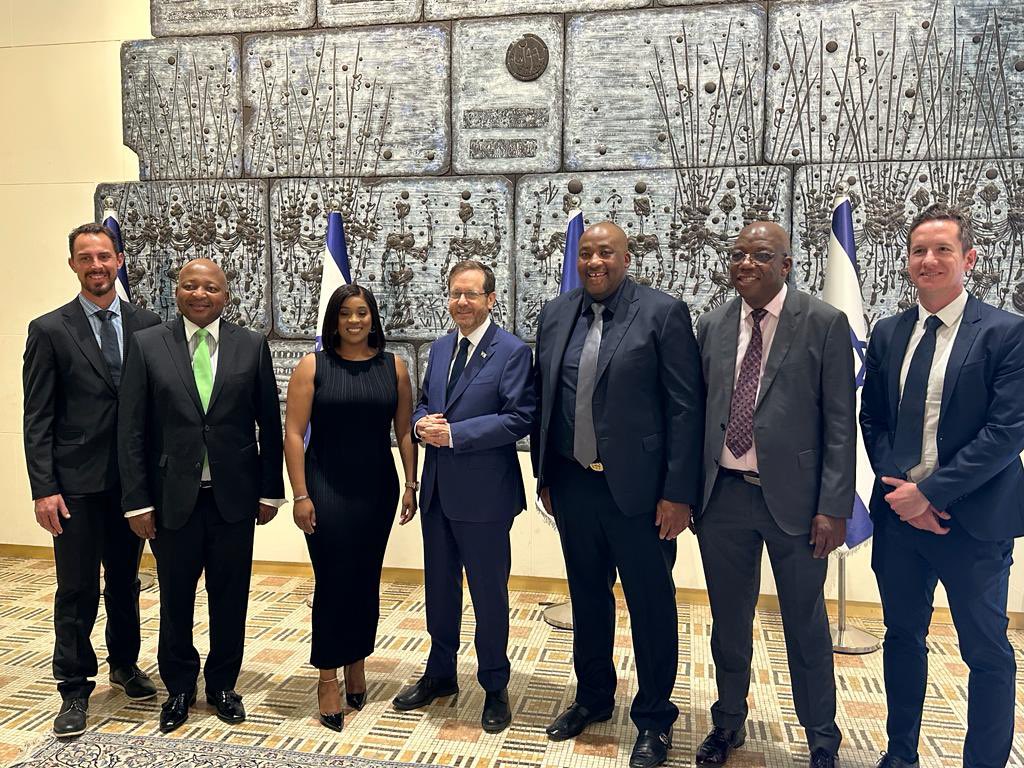The Patriotic Alliance delegation in Apartheid Israel Photo Twitter/ @GaytonMcK
South Africa – Al-Aqsa Mosque, located in Jerusalem, holds immense historical and religious significance for both Muslims and Jews. However, visiting the site has become a contentious issue due to conflicting narratives and control exerted by the Israeli authorities. A recent visit to Al-Aqsa Mosque by Gayton McKenzie, Patriotic Alliance (PA) leader, and his party has sparked controversy.
In a video published on the Patriotic Alliance Facebook page, McKenzie expressed his desire to see the “foundation stone”, referring to the Jewish narrative that deems it the holiest site for Jews. According to Jewish tradition, the stone is the place where creation began. However, this narrative has been challenged by archaeological findings, which do not support the claim, explained Abeer Zayyad, Archaeologist and historical expert.
“There is nothing from an archaeological point of view, going back to Sulaiman (AS) time and there is nothing called the foundation stone or something like that. I don’t know where his narrative is coming from and what he’s speaking about regarding the foundation stone. We can make it very clear from an archaeological point of view, the oldest archaeological remains are going back to Roman time. A Palestinian guy was a king during Roman time. His name is Herod and that’s the oldest in and around Al-Aqsa Mosque.”
SMread: PA Israel Visit Prompts Backlash
Visitor restrictions and Israeli control
In the video McKenzie points out that he was stopped and restricted access to visit the Muslim side of Al-Aqsa Mosque. On Monday, the PA’s co-founder, Charles Cilliers, went live on their Facebook page alleging the delegation was not allowed into the Al-Aqsa compound because they were not Muslim. A statement Zayyad deems false. The issue of visitor access to Al-Aqsa Mosque is complex and subject to political and religious considerations. Historically, tourists were allowed to visit the Mosque, but this changed after several incidents, including violent acts by non-Muslim visitors.
“In1969 an Australian Christian Zionist, [Denis] Michael Rohan entered Al-Aqsa Mosque and started a fire inside and damaged a lot of historical pieces. Also, a lot of settlers had entered as tourists, and they shot Palestinians and killed them inside Al-Aqsa Mosque. A lot of them also tried to enter with bombs to demolish Al-Aqsa Mosque. In 2000, Ariel Sharon, Former Israeli President, entered Al-Aqsa Mosque with the intention of putting the first stone to start building a new temple. Of course, the Palestinian people refused that, and we protested it. So, the Israeli army attacked the Palestinian and they started shooting the Palestinians inside Al-Aqsa Mosque.”
It was after this; it was decided not to allow anyone to enter Al-Aqsa Mosque who deem themselves to be tourists because “Zionist were using that to attack Al-Aqsa Mosque”. After this, Israel decided to open the Moroccan Gate without consulting the Muslims and Palestinians. It was also them who decided that non-Muslims “are not allowed to enter from any other gate”. They also decided the time and the restrictions.
“The Israeli police stop everyone who wants to enter Al-Aqsa Mosque. Sometimes they do not allow even Muslims to enter. Especially those that are coming from the West Bank or Gaza. Sometimes from Jerusalem. To enter, it is completely controlled by them. They check identification cards, checking names, sometimes asking you to read some of the Quran or ask you some questions.”
Many Palestinians are deeply concerned about Israel’s control over the mosque and its narrative dominance. They believe that Israel’s control allows them to present a skewed view of the site to non-Muslim visitors, which may perpetuate misunderstandings and misconceptions. The visit by McKenzie, his party and issues of visitor access and Israeli control, have brought to light the complexities surrounding the site.
